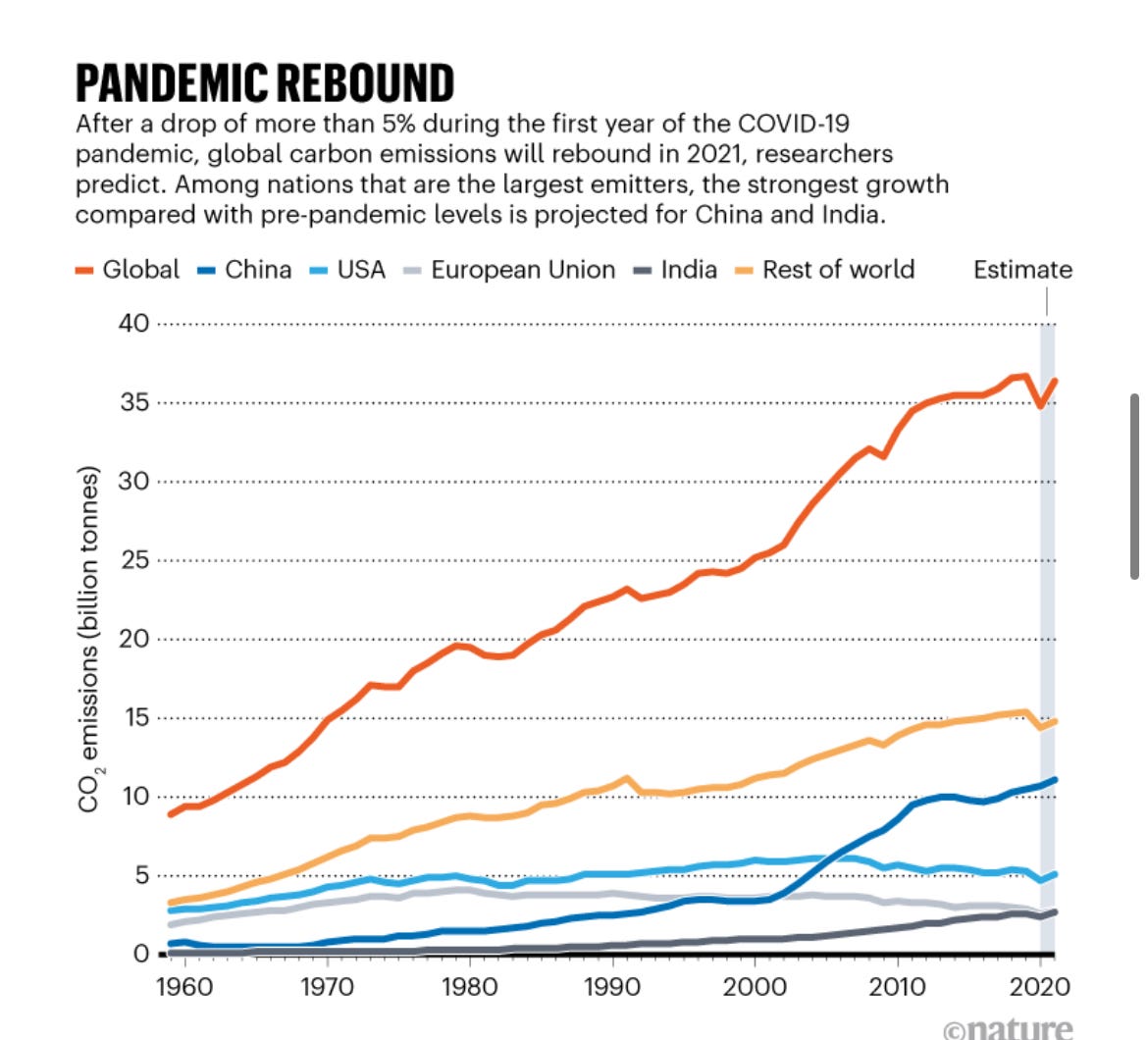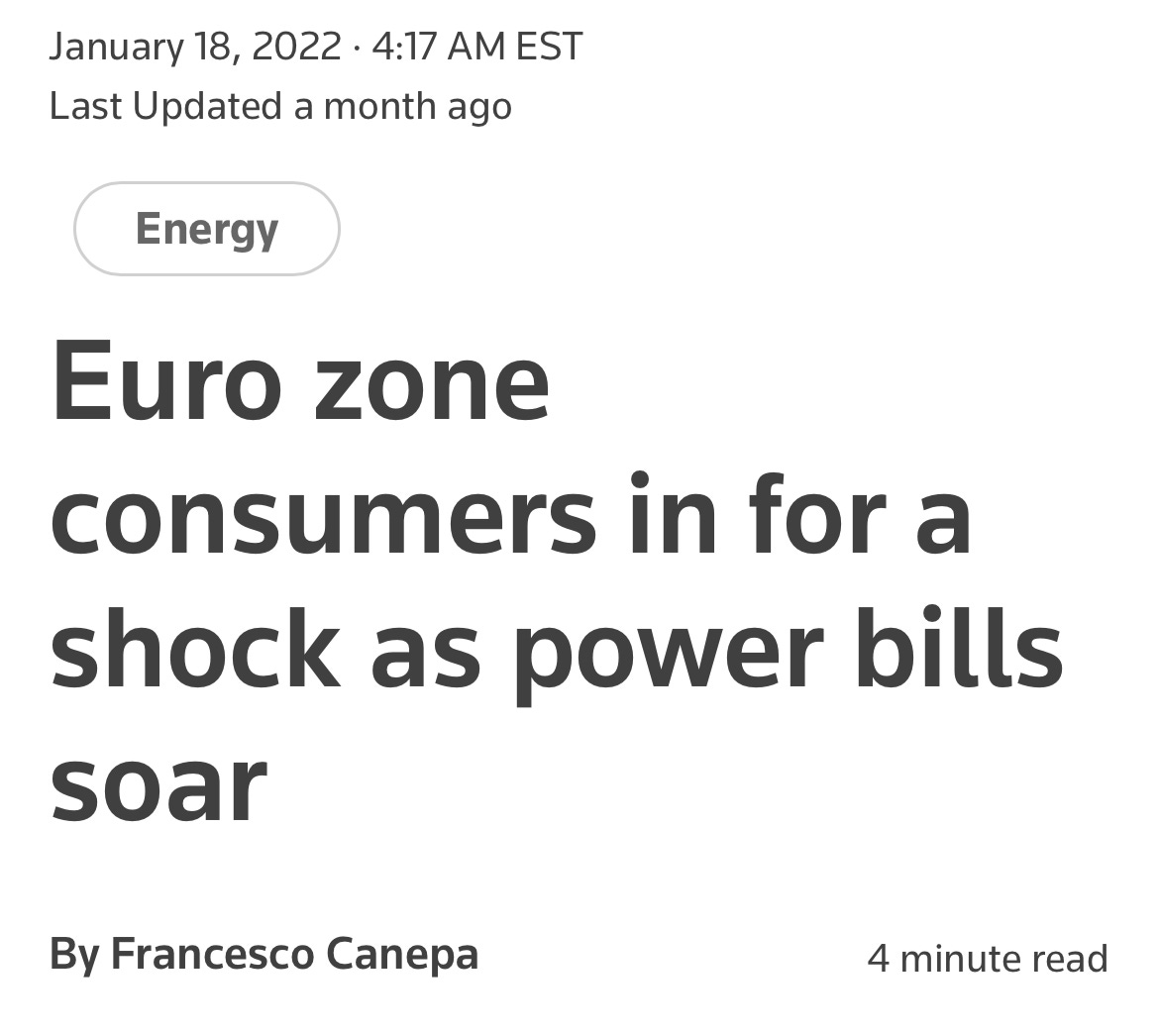Re-Gretas, Ukraine has a few
How the European obsession with decarbonization has driven energy and electricity prices through the roof and helped give Vladimir Putin license to do whatever he likes
Once again, Western political and media elites find themselves in the unfortunate position of denying reality obvious to anyone with eyes, or a wallet.
This time, they are lying about the economic and now political crises their “green” energy policies are causing, particularly in Europe. These lies may damage them even more than their Covid fantasies did, because they are even more obvious to people outside their bubble.
Anyone who drives is aware of the recent spike in oil prices, now nearly $100 a barrel - a rise due in part to Democratic efforts to discourage American oil production.
But Americans may not know about the catastrophe in Europe’s electricity and natural gas markets. That crisis is even more directly linked to broader efforts to “sustainable” fuels that so far have proven distinctly unsustainable.
Unlike the United States, Europe doesn’t have much oil or natural gas. For generations, it has used a mix of fuels - coal, nuclear, imported natural gas and a little oil, and renewables - to power its electric plants. That mix worked just fine.
But even before World Minister for Energy Policy Greta Thunberg banged her shoe against a desk at the United Nations in 2019, the Europeans were getting very worried about carbon dioxide.
—
A reminder: CO2 is what you get when you burn hydrocarbons like coal or oil.
(Or breathe, which makes every human being on the planet a greenhouse gas emitter, but let’s not even go there.)
—
Anyway, in part because they don’t have much of an oil industry to destroy, for the last 50 years or so, Europeans have been comfortable pushing energy efficiency with high gasoline taxes and high-speed trains and wind farms. Those are all basically harmless ways to prove they aren’t Americans. (The trains are actually nice.)
More recently, though, the screeching about global climate change has gotten loud. Let’s all agree; climate change is real, and carbon dioxide from fossil fuel emissions is the primary driver.
We all know who’s to blame, too.
Let’s look at this chart of carbon emissions over the last 60 years. Look how much the Europeans emit! It’s the light grey line. The one that’s dropping. No, look lower. Near the bottom. Yeah. That one -
That’s right.
The entire European Union now emits less carbon than India and about one-third as much as China. In fact, if every American and European stopped emitting carbon entirely and went back to living in caves, the world as a whole would still produce more carbon dioxide now than it did 20 years ago.
Okay, let’s not look at that chart anymore!
The point is, the Europeans want to do the right thing so that the Chinese and Indians can do more of the wrong thing. They need to set an example.
So they’ve cut way back on their coal mining and coal-fired electricity production.
Weirdly, they also don’t like nuclear energy. It emits zero carbon, but it’s mean to the uranium atoms or something, I dunno. In any case, Germany - Europe’s biggest economy - closed three nuclear plants in December and will close the three it has left before the end of 2022.
Which means that Europe has (intentionally) left itself increasingly dependent on the remaining two forms of energy, natural gas and renewables, to make electricity.
Now I’m going to let you in on a little secret about Europe. Don’t tell anyone, especially not Greta. Europe is pretty far north. Berlin is further north than Calgary, for example. Which means that during the winter - like now, say - Germany can’t rely on all those cool solar farms that get guys like Thomas Friedman excited.
—
Which means, work with me here, that Germany and Europe generally depend very heavily on natural gas for their electricity.
Now, it’s possible to ship natural gas around the world in cold storage on tankers. It’s possible. But it’s not that much fun. Liquified natural gas isn’t quite like oil. Bad things can happen to it if it’s disturbed. You know how your heating oil tank is in the basement but the propane cylinders stay outside? Just in case? Multiply that by a ship a thousand feet long.
Thus pipelines are the preferred way to move natural gas. Pipelines over land, or under water (but not oceans). Pipelines from a country reasonably close by.
Lucky for Europe, Russia has natural gas to spare. It provides about 35 percent of all of Europe’s natural gas, and that figure was about to increase as a new pipeline called Nord Stream 2 opened up.
35 percent is a lot - especially when your customers have gone out of their way to increase their dependence on you. Europe simply has no substitute for Russian natural gas in the short- or medium-term - meaning not months but years.
The Russians have already taken advantage of this fact. Since last year they have undersupplied their European customers. Natural gas prices have soared. Now electricity prices are about to follow them far higher.
As Reuters explained succinctly last month:
Electricity bills are expected to rise 54 percent in 2022 as “geopolitical tensions push up natural gas prices which the scarce supply of energy from renewable sources cannot offset.”
At this point, 54 percent might be optimistic.
The rise in electricity prices led to protests across Europe last fall. Countries like Italy are so worried what a shock this year might bring that they are considering directly subsidizing consumers.
Of course, the subsidies will flow more or less directly to the countries exporting the gas - in other words, Europe will be simultaneously sanctioning and paying for Russia’s little adventure in the Ukraine.
Worse, the subsidies will do nothing to change the fundamental problem, which is that Europe’s green fantasies are unable to produce enough power to keep the grid supplied unless demand goes down (prices are the hinge where supply and demand meet, as anyone who has not taken modern monetary theory knows).
Thus Europe is at the real risk of rolling blackouts. And prices for fertilizer and any manufacturing process that is energy-heavy are also out of control. Germany just reported a 25 percent year-over-year increase in producer prices for January 2022, hyperinflation territory.
—
Naturally, the same idealistic idiots who set us down this path have the answer. More of the same, double-quick! Over at CNN, this genius wants “the massive expansion of renewable energy, storage technologies, hydrogen technologies, and smart grids.”
Great. Hydrogen technologies. Those will fix everything, in about 2050. In the meantime, just buy some candles and blankets for the ninas and the ragazzos, okay? They’ll understand, they’re suffering for the future!
None of this insanity will touch the World Economic Forum elites responsible for it, of course. They have private jets on the road, and generators at home.
You know who else it won’t touch much? Our friends in the People’s Republic of China. Xi and the boys have been building coal-fired electric plants faster than you can say tectonic shift in global power. They now burn almost half the coal in the world. (True.)
Yeah, they’re pretty hedged against rising natural gas prices. Which is one less reason for them to care about Putin’s little adventure.
But Europe has some hard choices ahead. Even though energy prices are global, the United States is in slightly better shape, because our hydrocarbon industry is big and powerful enough that we haven’t gone as far down this road as the Europeans.
Still, this crisis spells trouble ahead. We need to manage the transition away from oil and coal very carefully - and stop blaming ourselves for a problem that is now centered in Beijing.
Of course, the elites won’t admit any of this. They’re blaming the weather, or Putin, or just doing their best to ignore it.
Make no mistake, Putin might still have gone after Ukraine if the Europeans hadn’t decided to try to live on windmills and Muesli. But ask yourself this: is it coincidence that he waited for the Germans to pull mothball those three nuclear plants before he got hot and heavy on the border? Right now, hard-core energy sanctions are off the table, and those are the only sanctions that might make the Russians pay attention.
The road to hell is paved with good intentions. And paying too much attention to Swedish teenagers.








"climate change is real, and carbon dioxide from fossil fuel admissions is the primary driver."
Eh, not a big fan of unfalsifiable hypothesis, whether they're dealing with vaccine effectiveness (it would have been worse!) or with "climate change".
I figure if climate change is real, they wouldn't have fudge the numbers from the past to make today's numbers look hotter. Or make adjustments to the current temperature data that is the opposite of what's expected. Or use statistical tricks like upside down Tiljander. Or say stuff like "Why should I make the data available to you, when your aim is to try and find something wrong with it."
The whole covid/vaccine playbook was created from the "climate change" playbook.
You lost me at "climate change is real".
Ya, but so what?
F.